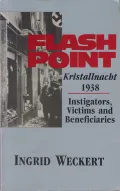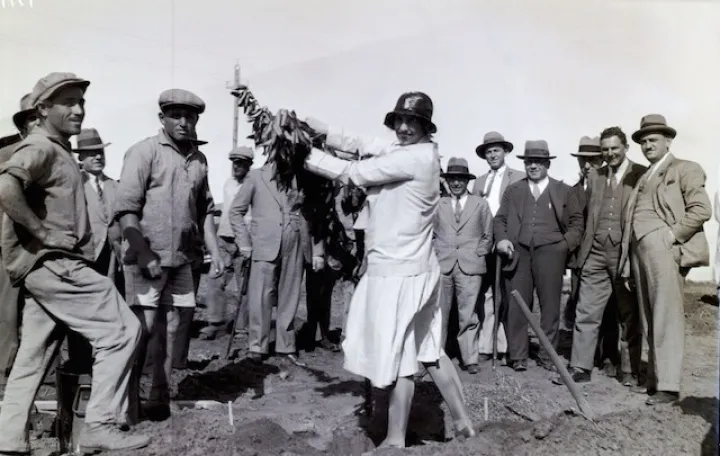FLASHPOINT Kristallnacht 1938: Instigators, Victims and Beneficiaries by Ingrid Weckert
Translated by Mr. Carl Hottelet from the original German
English translation Copyright 1991 by Institute for Historical Review in arrangement with Grabert Verlag, Tübingen, Germany
by Carolyn Yeager
Part Seven - Conclusion
I'VE CHOSEN TO COPY CHAPTER 19 of the book Flashpoint in full, as it is only a little over two pages in length. It presents the key conclusions that were apparent to any honest researcher studying 20th century German history in the year of publication 1978. The role played by the professional propagandists and behind-the-scenes actors must be taken into account, which Weckert does. Following Chapter 19, I'll introduce a few other important points and events brought up by her that I think will conclusively settle the question, by removing any doubts as to who were the perpetrators and who the victims of the famous Kristallnacht.
Let me add that I've received a number of comments on this series that I decided not to publish in the comments sections, for the reason they are argumentative and stem not from an honest difference of opinion or facts, but from opinions of selectively quoted authors who fall into the category of "professional propagandists" (apologists for the Jewish/Israel/Holocaust agenda). These commenters are also anonymous. Why anonymous? They may all be from the same source.
So, following this installment, I'm glad to publish any critical comments that seem sincere and serious, but I don't have time or inclination to refute peripheral quote(s) from sources that cannot be taken seriously, yet necessitate a careful response. I hold the line on allowing my website to be used for false enemy propaganda.
Cui Bono?
Pgs. 99-101
As time passed, Dr. Goebbels, naturally, must have asked himself, over and over, whether these commotions really erupted spontaneously among the German people, or whether they may have been instigated and organized by powers that still remained hidden. These thoughts must have come to him especially as the well-synchronized nature of the demonstrations became apparent. A man of Goebbels' intelligence must have conjectured, and with the privileged knowledge of the mentality of his people, must have deduced that the whole action had been orchestrated. But by whom? By some fanatical enemy of the Jews? Or, maybe, by the Jews themselves?
In 1938 certain Jewish-Zionist circles were trying by every means to induce Jews to emigrate from Germany to Palestine, to reinforce the Jewish communities already there, and to improve the economic base of the “Yeshuv,” the collective of Jewish communiies in Palestine. [The Zionists wanted the Jews from Germany above all others for their new state-to-be because they were the most intelligent, best educated and better behaved Jews in Europe. -cy]
In a volume of [Vladimir] Jabotinsky's writings published in Vienna in 1938, he uses the term “propitious storm” for occurrences that make life in their host countries so unbearable for Jews that—driven by the events—they choose emigration to Palestine. “This 'storm,' however terrifying it may be, blows the Jewish ship in the direction in which we ourselves want to guide it.” (Der Judenstaat, Vienna 1938, p 133)
While Jabotinsky writes later that the occurrences—which ones is left unmentioned—in National Socialist Germany had rather the effect of a hurricane, that wasn't so unwelcome to him either, just so long as it drove the Jewish ship to Palestine. For the same reason, he is gratified that the gates of the other countries remain closed to the Jews coming from Germany.
The banished of the new Third Reich, like refugees fleeing a beleagured city, see before them not open doors, but iron chains. We Zionists, whose goal is the Jewish State, with clenched teeth will be the first to rejoice in this, in the interest of Zionism.” (Der Judenstaat, p. 135)
Those who pulled the strings of the Kristallnacht might well have come from partisans of such an ideology. In this connection it is interesting to note here, that in 1970 Dr. Hjalmar Schacht, looking back on 1938, assessed the Zionist leader Chaim Weissmann:
I do not think it should be excluded from consideration that Weizmann said to himself, “I will achieve my goal to rebuild Zion, and found a Jewish State, only if I am willing to allow great sacrifices to give an impetus to the course.” I believe he nurtured the idea of creating victims. (Conversations with journalist and author Rolf Vogel, Jan. 16, 1970, cited in his book Ein Stemple hat gefehlt. Munich 1977, page 211.)
For the Zionists who shared the thought processes of Jabotinsky, anti-Jewish demonstrations at the beginning of 1938 were especially opportune. A brief look at the circumstances attending the development of the Jewish communities in Palestine at the time will make that understandable.
Massive immigration of Jews into Palestine began in the last decades of the nineteenth century. At first, the indigenous Arabs had not the slightest objection to Jewish settlement. On the contrary, they were beneficiaries of the advantages derived from it. To a large extent, the land belonged to Turkish “effendis” (gentlemen), who hardly cared about its cultivation. When the Jewish settlers arrived and bought the land from the Turks, swamps were drained, plantationss established, settlements built, and the beginnings of an industry created. The Arab population worked together with the Jews in the agricultural settlements and profited from the incipient economic boom.
As the years passed, the Great Powers of the time became aware of the importance of Palestine to global politics, and began to take an interest in what was happening there. During the first World War, British troops occupied Palestine which then, as we have already indicated, belonged to Turkey, an enemy. Present-day Syria—then also belonging to Turkey—was occupied by the French.
To win the support of the native population, Great Britain promised the Jews, and then the Arabs, British support in setting up a national state. This double promise to the Jews in 1917, to the Arabs in 1919, is the primary cause of the disturbances and the wars that have been wracking the area ever since.
After the 1914-1918 war, the League of Nations gave Britain a mandate with the stipulation that it provide for a national homeland for the Jewish people in that country. Serious difficulties soon arose between the British Mandate government and the Palestinian population. Thereupon, true to the English maxim “divide and conquer,” first the Jews, then the Arabs, were favored. Nor could a feeling of hostility between the two population groups fail to develop. The Judeo-Arab conflict began waves of Jewish immigration, Arab revolt, British restrictions on Jewish immigration, forming a vicious cycle within which British Palestine policy was carried on over the following years. Confronted by the outcome of their devious behavior, the British had finally to announce the failure of their mandate.
In the summer of 1937, a special commission under the direction of Lord Peel worked out a scheme to divide the country, with the aim of having Jews and Arabs each hold a separate part that each group would administer. The representatives of the Jewish side, the Zionist organization under Weizmann and Ben Gurion, agreed to this proposal—albeit with substantial reservations. They saw in it a possibility of having a territory of their own that one day would be sovereign, and for which there could be no restrictions on the immigration of Jews. The Arabs, however, brusquely rejected the scheme.
The result was more disturbances and revolts. In Europe, the English began preparing for the Second World War. Palestine appeared important to them as a strategic crossroads. What they needed now, under any circumstances, in that country, was calm. In an attempt to maintain peace and order, a new High Commissioner, Sir Harold MacMichaels, was installed in March, 1938. MacMichaels acted firmly; two British divisions put down the revolts. At the same time, he promised the Arabs, whom he held to be the more important part of the population, that he would undertake to have Jewish immigration stopped, and to have Britain give up its plan to partition Palestine.
At the beginning of October, 1938, he took those recommendations to London. After some discussion, the British government agreed to his proposals. For the Jews, this seemed to mean the end of all hope. Just now, when they needed a land for immigration more urgently than ever, Palestine was to be closed to them.
Among the Jews, there were feverish discussions as to how this fateful decision of the British government could be impeded. The government's decision was to be published on November 8, 1938. The possibility, at least, cannot be discarded that certain groups among the Jews felt, or hoped, that the English government would think again if it suddenly—and on its doorstep, so to speak—experienced an anti-Jewish pogrom.
The murderous attack on vom Rath on the 7th, sending provocateurs into Germany on the 8th, setting synagogues on fire on the 9th, fit very neatly into this scheme of things.
The hope, if it ever existed, was vain. The British watched the spectacle impassively, delayed for a day the announcement of their decision, and on November 10, 1938 published a resolution abandoning definitely their partition plans.
A limitation, tantamount to stoppage, of immigration was adopted, at first internally. It was published in the British White Book of March 1939. [end of chapter 19]
* * *
IN CHAPTER 20, Weckert analyzes the minutes of a conference in December 1938 of the Ministry of the Interior under Dr. Wilhelm Frick. What stands out from this is the firm commitment of National Socialist Germany to solve their Jewish problem, but in a completely legal manner, cognizant of world opinion. From the minutes:
Everything now depended on attaining our goal: the clean separation of the German from the Jew, without thoughtlessly creating difficulties. Negotiations are in progress with foreign states that should make large-scale emigration possible. The President of the Reichsbank, Dr. Schacht is now in London for this purpose.
Negotiations are underway to bring about the possibility of overcoming, by furnishing supplementary exports, the main resistance of other states who don't want impecunious Jews under any circumstances. (p.103)
Increased exports were necessary to enable Germany to buy the foreign exchange she had to give the emigrating Jews.
[Interior Minister Frick] was instructed by the Minister-president (Hermann Goering) to point out that, fundamentally, [for this reason] export interests now took precedence over Aryanisation [in business and industry] ... Also Jewish passports are being marked with a “J”. This measure was especially requested by foreign countries, who wanted to know which emigrants were Jews. (p. 103)
The Kristallnacht marked a turning point in German “Jewish policy,” writes Weckert. The “Reich Central Office for Jewish Emigration” was founded. Its counterpart on the Jewish side, for purposes of negotiation, was the “Reich Union of Jews.” The Union advised and helped Jews on problems of emigration, insofar as internal Jewish interests were concerned. The Reich Central Office ironed out difficulties in regard to transportation, baggage, and transfer of foreign exchange. It also financed retraining centers to enable emigrants to enter [learn] crafts and trades for which there was a demand.
In Chapter 25, titled “Conclusions,” Ingrid Weckert states that “up to the present day not an atom of evidence linking anyone in the government of the Third Reich to the Kristallnacht has been presented.”
Weighing all the data, it can be affirmed, with highly probable certainty, that it was the LICA who induced Grynspan to murder Vom Rath. There is a valid conjecture why he refused to admit that during his police interrogations: the LICA had guaranteed him its (very potent) support—on condition he remain silent. The LICA lawyer Moro-Giafeiri was at his side immediately after Grynspan's murderous assault. (p. 131)
After the war Hershel Grynspan was released, with a brand new identity, to Paris. An American-Jewish organization got his impoverished father, mother and two siblings, who had been living the whole time on German welfare, admitted into Palestine, which required $1000 Palestinian Pounds Sterling at that time.
Along with Lecache's Ligue International Contre l'Anti-Semitisme (LICA) in Paris and Jabotinsky's Zionist Revisionist Party, who else had an interest in promoting a pogram in Germany? Weckert brings up for special note the Fuehrer's personal adjutant Captain Fritz Wiedermann (Ret), a traitor who “behind Hitler's back maintained liason with British Intelligence, passing over secret records of conferences, reports and other confidential material to which he had easy access. By spurious accounts and lying tales, he sought to create the impression in England that Germany was in 'complete confusion,' the Fuehrer's authority and prestige ruined, not only among the entire German people but among his closest collaborators.”
In a June 30, 1938 report to (British Foreign Secretary) Vansittart, Wiedemann claims that a number of "highly placed observers were of the view that a political setback for the Nazi-system and for the Fuehrer himself—as long as it did not hurt the German people—would have some repercussions and hasten the coming of the crisis.” (Anneliese von Ribbentrop, Die Kriegsschuld ds Widerstandes. Aus britishenGeheimdocumenten 1938/1939, Leoni: 1974, pp. 112 f.) All these German traitors told the same lie to themselves to exonerate their guilt: that what they were doing would not harm Germany itself, but only the hated Hitler and his government. But the British and Americans, along with their Jewish allies, made no such promise and had a very different future in mind.
What were the concerns of the German government at the time of Kristallnacht?
Weckert makes the clear and confident statement:
The overriding interest of the German leadership did not lie in fomenting anti-Jewish disturbances but in bringing about the inner unity of the German people and to enhance respect for it abroad.(p. 137)
Neither Reich Chancellor Adolf Hitler, Propaganda Minister Joseph Goebbels, or the Chief of German Police Heinrich Himmler could have any interest whatsoever in any kind of disturbance, but instead had a vital interest in the prevalence of calm and order in the Reich. These aims, so clearly evident in the years of peace, seem today to have been expunged from public awareness. The actual measures that were taken against Jews in the Third Reich (like the Nuremberg Laws) were only to bring about “their exclusion from the spiritual community of the German people.”
We see this very same “spiritual exclusion” of non-Jews in the State of Israel, but without any of the moral baggage that's been loaded on the Germans. This, in itself, proves who was intended to benefit from the hatred so carefully nurtured against the National Socialist state, but equally carefully, and by the same players, away from the new Jewish state, Israel.
Ingrid Weckert ends her book with Chapter 26: "Kristallnacht without End?" I fully endorse and close with her summation:
For a people that demands special privileges, that insists on priority of place—and be it only the priority of suffering—integration into the community of peoples is impossible.
The Jews of Germany and of Europe suffered no more in the war that did the inhabitants of other European states. They were no more the victims of planned genocide than were other peoples (and decidedly less so than were the Germans and the Japanese). Their fate was not an extraordinary one, and their pretension to a preferential place among nations is supported by nothing.
Only when the Germans become conscious once more of their own worth, when they cease in cowardly fashion to give in to the Jews extortionate demands; when they rise from the breast-beating mea culpa posture into which they were forced in 1945, will a natural relationship among the free peoples be possible. (pgs. 143-144)
This was written in 1978. It's now 44 years later and we haven't moved an inch.
- 1501 views








I'd say we've moved backwards
R. Dan offensive
I'd say we've moved backwards. When i was in school, freedom speech included nazi rallies. That is no longer the case. Especially in this cyber world is censorship prevalent. yet, on the other hand, i never expected to become an evil holocaust denier. Never included it on my radar. 卐
Definitely.
carolyn
When I was in school, it was possible to have an opinion on 3rd Reich Germany, although you would surely be disapproved of if it were favorable. But freedom of thought was respected, and seriously guaranteed. Now it's not.
But we DO have more information and factual knowledge, in spite of the efforts to silence it. That's why there are more holocaust deniers than ever (as a percentage of population)! And we're also aware of the censorship in our own "democracies" which we weren't back then. I think our system is in the process of collapsing -- which it seems is the only possible outcome. It's so rotten.